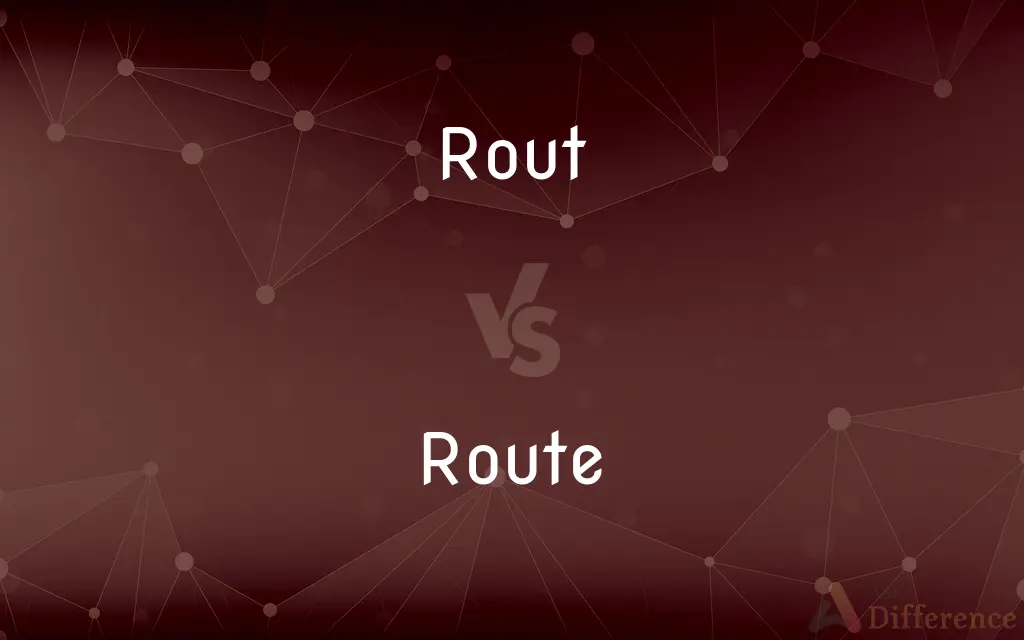Rout vs. Route — What's the Difference?
By Tayyaba Rehman & Maham Liaqat — Updated on March 24, 2024
A rout is a disorderly retreat or defeat, often in a military context, while a route is a path or way taken to get from one place to another.

Difference Between Rout and Route
Table of Contents
ADVERTISEMENT
Key Differences
Rout often refers to a chaotic and disorderly retreat, especially in a military context, indicating a significant loss or defeat. This term carries a connotation of confusion and disarray among the defeated party. On the other hand, route is used to describe a specific path or direction taken to reach a destination, emphasizing the planning and direction aspect of travel or transportation.
Rout implies a breakdown of order and often results in a panicked fleeing from a situation. It suggests a scenario where an organized formation dissolves into a scattered, fleeing mass. Whereas, a route, whether in the context of travel, data networking, or logistics, implies a structured and pre-defined pathway, often optimized for efficiency and clarity in reaching an endpoint.
While a rout is inherently negative, reflecting a failure or disastrous outcome, a route can be neutral or positive, focusing on the methodological aspect of moving from one point to another. Routes are integral to daily life, from road trips to data packets traveling across the internet, whereas a rout is typically something to be avoided or a situation that has gone awry.
In historical contexts, the term rout has been used to describe significant military defeats where an army is not just beaten, but forced into a chaotic and undignified retreat. In contrast, historic and strategic routes such as the Silk Road or the routes of the Crusades highlight the importance of chosen paths in shaping economies, cultures, and outcomes.
Rout can also metaphorically refer to a comprehensive defeat in non-military contexts, like sports or politics, where the losing side is overwhelmed. Meanwhile, a route in these contexts could refer to a strategy or plan of action, underscoring the different applications of the two terms based on context.
ADVERTISEMENT
Comparison Chart
Definition
A disorderly retreat or overwhelming defeat, often in battle.
A path, direction, or course taken to get from one place to another.
Context
Military, sports, politics.
Travel, navigation, logistics, data networking.
Connotation
Negative, implying disorder and defeat.
Neutral, focusing on planning and direction.
Historical Usage
Describes significant defeats or disorganized retreats in battle.
Indicates specific pathways important in trade, exploration, etc.
Metaphorical Usage
Can imply a complete failure in various competitions.
Refers to strategies or planned approaches in various fields.
Compare with Definitions
Rout
To cause to retreat in a disorderly fashion.
The surprise attack routed the invaders.
Route
To send or forward by a specific path.
The courier will route the package via air freight.
Rout
A disorderly retreat following a defeat.
The army's rout was complete, leaving the battlefield in chaos.
Route
A way or course taken to reach a destination.
We chose a scenic route through the mountains.
Rout
A state of confusion or disorder.
The sudden evacuation caused a rout among the residents.
Route
A method or way of doing something.
The route to success requires hard work.
Rout
An overwhelming defeat in competition.
The team faced a rout, losing by forty points.
Route
In computing, to direct data to its destination.
The router efficiently routes internet traffic.
Rout
A fashionable gathering.
Route
A fixed itinerary or direction for travel.
The delivery route covers all major cities.
Rout
A rout is a panicked, disorderly and undisciplined retreat of troops from a battlefield, following a collapse in a given unit's command authority, unit cohesion and combat morale (esprit de corps).
Route
A road, course, or way for travel from one place to another
The route from Maine to Boston takes you through New Hampshire.
Ocean routes that avoided the breeding grounds of whales.
Rout
A disorderly retreat or flight following defeat.
Route
A highway
Traveled on Route 12 through Michigan.
Rout
An overwhelming defeat.
Route
A fixed course or territory assigned to a salesperson or delivery person.
Rout
A disorderly crowd of people; a mob.
Route
A means of reaching a goal
The route to success required hard work.
Rout
People of the lowest class; rabble.
Route
(Football) A pass pattern.
Rout
A public disturbance; a riot.
Route
To send or forward by a specific route.
Rout
(Archaic) A group of people, especially knights, or of animals, especially wolves.
Route
A course or way which is traveled or passed.
The route was used so much that it formed a rut.
You need to find a route that you can take between these two obstacles.
Rout
To put to disorderly flight or retreat
"the flock of starlings which Jasper had routed with his gun" (Virginia Woolf).
Route
A regular itinerary of stops, or the path followed between these stops, such as for delivery or passenger transportation.
We live near the bus route.
Here is a map of our delivery routes.
Rout
To defeat overwhelmingly.
Route
A road or path; often specifically a highway.
Follow Route 49 out of town.
Rout
To dig with the snout; root.
Route
(figuratively) One of multiple methods or approaches to doing something.
Rout
To poke around; rummage.
Route
(historical) One of the major provinces of imperial China from the Later Jin to the Song, corresponding to the Tang and early Yuan circuits.
Rout
To expose to view as if by digging; uncover.
Route
(computing) A specific entry in a router that tells the router how to transmit the data it receives.
Rout
To hollow, scoop, or gouge out.
Route
(horse racing) A race longer than one mile.
Rout
To drive or force out as if by digging; eject
Rout out an informant.
Route
(transitive) To direct or divert along a particular course.
All incoming mail was routed through a single office.
Rout
(Archaic) To dig up with the snout.
Route
(Internet) to connect two local area networks, thereby forming an internet.
Rout
To bellow. Used of cattle.
Route
To send (information) through a router.
Rout
A group of people; a crowd, a throng, a troop; in particular (archaic), a group of people accompanying or travelling with someone.
Route
The course or way which is traveled or passed, or is to be passed; a passing; a course; a road or path; a march.
Wide through the furzy field their route they take.
Rout
A group of animals, especially one which is lively or unruly, or made up of wild animals such as wolves; a flock, a herd, a pack.
Route
An established line of travel or access
Rout
(countable) A group of disorganized things.
Route
An open way (generally public) for travel or transportation
Rout
(countable) A group of (often violent) criminals or gangsters; such people as a class; (more generally) a disorderly and tumultuous crowd, a mob; hence , the common people as a group, the rabble.
Route
Send documents or materials to appropriate destinations
Rout
A fashionable assembly; a large evening party, a soirée.
Route
Send via a specific route
Rout
A noisy disturbance; also, a disorderly argument or fight, a brawl; (uncountable) disturbance of the peace, commotion, tumult.
Route
Divert in a specified direction;
Divert the low voltage to the engine cylinders
Rout
An illegal assembly of people; specifically, three or more people who have come together intending to do something illegal, and who have taken steps towards this, regarded as more serious than an unlawful assembly but not as serious as a riot; the act of assembling in this manner.
Rout
The act of completely defeating an army or other enemy force, causing it to retreat in a disorganized manner; (by extension) in politics, sport, etc.: a convincing defeat; a thrashing, a trouncing.
The rout of the enemy was complete.
The visiting football team was put to rout.
Rout
The retreat of an enemy force, etc., in this manner; also , the army, enemy force, etc., so retreating.
Rout
A loud, resounding noise, especially one made by the sea, thunder, wind, etc.; a roar.
Rout
A lowing or mooing sound by an animal, especially cattle; a bellow, a moo.
Rout
A loud shout; a bellow, a roar; also, an instance of loud and continued exclamation or shouting; a clamour, an outcry.
Rout
A violent movement; a heavy or stunning blow or stroke.
Rout
The brant or brent goose (Branta bernicla).
Rout
To assemble in a crowd, whether orderly or disorderly; to collect in company.
Rout
(transitive) To completely defeat and force into disorderly retreat (an enemy force, opponent in sport, etc.).
Rout
To retreat from a confrontation in disorder.
Rout
To snore, especially loudly.
Rout
To make a noise; to bellow, to roar, to snort.
Rout
Especially of the sea, thunder, wind, etc.: to make a loud roaring noise; to howl, to roar, to rumble.
Rout
(transitive) Of a person: to say or shout (something) loudly.
Rout
(intransitive) Of a person: to speak loudly; to bellow, roar, to shout.
Rout
(intransitive) Of an animal, especially cattle: to low or moo loudly; to bellow.
Rout
(transitive) To dig or plough (earth or the ground); to till.
Rout
(transitive) Usually followed by out or up: of a person: to search for and find (something); also (transitive) to completely empty or clear out (something).
Rout
Usually followed by from: to compel (someone) to leave a place; specifically (usually followed by out or up), to cause (someone) to get out of bed.
Rout
(ambitransitive) Of an animal, especially a pig: to search (for something) in the ground with the snout; to root.
Rout
(ambitransitive) To use a gouge, router, or other tool to scoop out material (from a metallic, wooden, etc., surface), forming a groove or recess.
Rout
(intransitive) Of a person: to search through belongings, a place, etc.; to rummage.
Rout
(transitive) Usually followed by out or up: to dig or pull up (a plant) by the roots; to extirpate, to uproot.
Rout
Usually followed by out: to find and eradicate (something harmful or undesirable); to root out.
Rout
To beat or strike (someone or something); to assail (someone or something) with blows.
Rout
To roar; to bellow; to snort; to snore loudly.
Rout
To scoop out with a gouge or other tool; to furrow.
Rout
To search or root in the ground, as a swine.
Rout
To break the ranks of, as troops, and put them to flight in disorder; to put to rout.
That party . . . that charged the Scots, so totally routed and defeated their whole army, that they fied.
Rout
To assemble in a crowd, whether orderly or disorderly; to collect in company.
In all that land no Christian[s] durste route.
Rout
A bellowing; a shouting; noise; clamor; uproar; disturbance; tumult.
This new book the whole world makes such a rout about.
"My child, it is not well," I said,"Among the graves to shout;To laugh and play among the dead,And make this noisy rout."
Rout
A troop; a throng; a company; an assembly; especially, a traveling company or throng.
And ever he rode the hinderest of the route.
A rout of people there assembled were.
Rout
A disorderly and tumultuous crowd; a mob; hence, the rabble; the herd of common people.
The endless routs of wretched thralls.
The ringleader and head of all this rout.
Nor do I name of men the common rout.
Rout
The state of being disorganized and thrown into confusion; - said especially of an army defeated, broken in pieces, and put to flight in disorder or panic; also, the act of defeating and breaking up an army; as, the rout of the enemy was complete.
Thy army . . . Dispersed in rout, betook them all to fly.
To these giad conquest, murderous rout to those.
Rout
A disturbance of the peace by persons assembled together with intent to do a thing which, if executed, would make them rioters, and actually making a motion toward the executing thereof.
Rout
A fashionable assembly, or large evening party.
Rout
A disorderly crowd of people
Rout
An overwhelming defeat
Rout
Cause to flee;
Rout out the fighters from their caves
Rout
Dig with the snout;
The pig was rooting for truffles
Rout
Make a groove in
Rout
Defeat disastrously
Common Curiosities
What does it mean to choose a route?
Choosing a route means selecting a specific path or direction to reach a destination, often based on criteria like distance, scenery, or traffic.
Can rout be used outside of military contexts?
Yes, rout can also describe a complete defeat or overwhelming loss in sports, politics, and other competitive scenarios.
Is route specific to physical travel?
While route often refers to physical paths, it can also apply to virtual or strategic pathways, such as data routing in networks or steps towards achieving a goal.
How do you use rout in a sentence?
You can use rout in a sentence to describe a significant defeat or disorganized retreat, e.g., "The army experienced a rout when they were unexpectedly ambushed."
Can you reroute during travel?
Yes, it's common to reroute during travel due to changes in plans, road conditions, or to explore new areas.
What is a rout in military terms?
A rout in military terms refers to a disorderly and chaotic retreat of troops, typically following a defeat.
What's the difference between a direct and scenic route?
A direct route is the shortest, most straightforward path to a destination, while a scenic route prioritizes beautiful or interesting landscapes over efficiency.
What role do routers play in data routing?
Routers direct internet traffic, ensuring data packets take optimal paths through a network to reach their destinations.
How do logistics companies determine the best routes?
Logistics companies use criteria like distance, traffic patterns, and delivery priorities to determine the most efficient routes for transportation.
Is there a metaphorical use for route?
Yes, route can metaphorically refer to a plan or method to achieve an objective, not just physical paths.
What's the importance of historic routes?
Historic routes, like the Silk Road, are important for understanding the spread of cultures, trade, and the development of civilizations.
Can a rout be positive?
Typically, a rout is not considered positive, as it implies defeat and disorder.
How do you plan a route for a road trip?
Planning a route for a road trip involves considering factors like destinations, attractions, rest stops, and road conditions.
What strategies can help recover from a rout?
Recovering from a rout may involve analyzing what went wrong, rebuilding team cohesion, and strategic planning to avoid future defeats.
How does a rout affect team morale?
A rout can significantly impact team morale, often leading to feelings of demoralization and a need for reassessment and motivation.
Share Your Discovery

Previous Comparison
Diamond vs. Rhombus
Next Comparison
Affective vs. EffectiveAuthor Spotlight
Written by
Tayyaba RehmanTayyaba Rehman is a distinguished writer, currently serving as a primary contributor to askdifference.com. As a researcher in semantics and etymology, Tayyaba's passion for the complexity of languages and their distinctions has found a perfect home on the platform. Tayyaba delves into the intricacies of language, distinguishing between commonly confused words and phrases, thereby providing clarity for readers worldwide.
Co-written by
Maham Liaqat












































